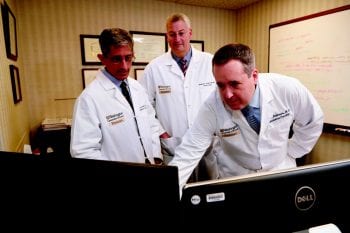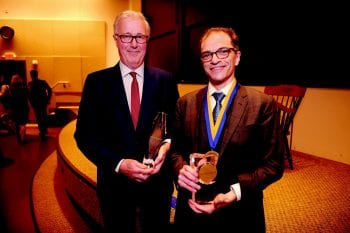Focus: Study patient-reported outcomes

Washington University thoracic surgeons at Barnes-Jewish Hospital will soon be tracking early-stage lung cancer patients once they have chosen either surgical intervention or nonoperative therapy in order to better analyze patient outcomes along with patients’ decision-making processes and perceived quality of life after treatment.
“Early-stage lung cancer patients have about an 80 percent five-year survival,” says surgeon Benjamin Kozower, MD, MPH. “It’s not the gloom and doom we have associated with lung cancer.”
Surgeon Varun Puri, MD, MSCI, and radiation oncologists at Barnes-Jewish Hospital previously have used comparative effectiveness studies to gauge survival in high-risk, early-stage lung cancer patients who received partial lung removal versus stereotactic body radiation therapy (SBRT). For these patients, cancer-specific survival rates were similar between SBRT and surgery.
Kozower’s research has focused on early recovery after surgery protocols, volume-outcomes relationships for thoracic surgery, and long-term results for early stage lung cancer patients comparing those who had all or a portion of a lung removed. Most recently, he led a study analyzing the National Cancer Database that determined more frequent surveillance after lung cancer removal was not associated with improved survival. The Patient-Centered Outcomes Research Institute (PCORI) supported the study.
Both researchers recognize that previous retrospective studies of surgery versus radiation for early-stage lung cancer have a selection bias: patients who went to a radiation oncologist or surgeon generally were steered toward that specialist’s modality. Their next study, therefore, is a prospective one that begins at diagnosis. Early-stage lung cancer patients will choose surgery or radiation, and their outcomes and decision-making process will be studied over a five-year period.
“Dr. Kozower has done significant patient-centered outcomes research, while we have utilized statistical methods to look at comparable patients and their short- and long-term outcomes,” says Puri. “This research is important because there is no high-quality data on patient-reported outcomes after diagnosis in early-stage lung cancer patients.”
Highlights
Daniel Kreisel, MD, PhD, surgical director of the lung transplant program and scientific director of the Washington University and Barnes-Jewish Transplant Center, has been named the first G. Alexander Patterson, MD/Mid-America Transplant Endowed Distinguished Chair in Lung Transplantation. Patterson, the Joseph Bancroft Professor of Surgery, was director of the Lung Transplant Center from 1991 to 2014, during which it became one of world’s largest and most respected lung transplant programs. Kreisel is a leading lung transplant researcher who has reported major immunologic discoveries related to lung transplant rejection.
A new lung-protective management protocol used in brain-dead donors has been shown to improve the percentage of donated organs available for transplant by almost 75 percent over the national average. The protocol, published in the May 2018 issue of The Annals of Thoracic Surgery, included greater ventilatory management, lung percussion, appropriate use of intravenous volume, frequent bronchoscopic evaluations, and donor turning to optimize lungs. The study found that about 35 percent of donated organs were viable for transplant when using the protocol as compared to the national average of 20 percent. Thoracic surgeon Varun Puri, MD, MSCI, was senior author of the study.
Section Chief Bryan Meyers, MD, MPH, chair of the American Board of Thoracic Surgery, presided over his first oral boards, the certifying examination for thoracic surgeons. All four Washington University cardiothoracic surgery fellows passed. The success of these trainees is a point of pride for the program, as the national pass rate is below 80 percent.
